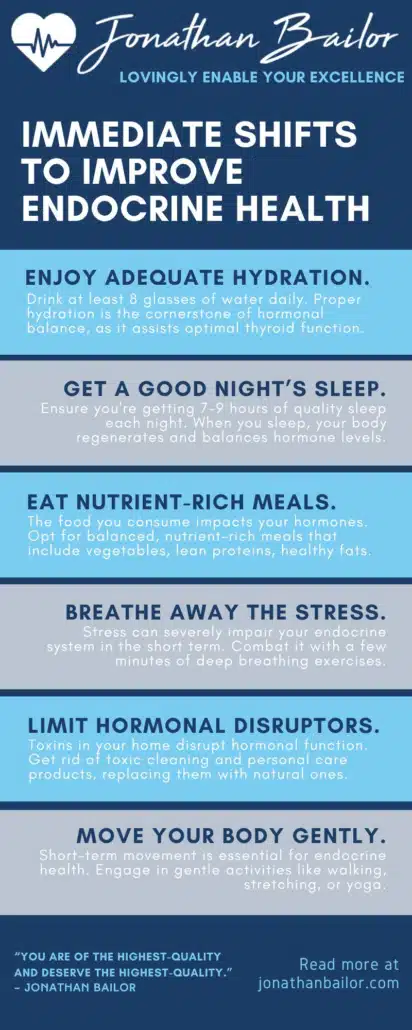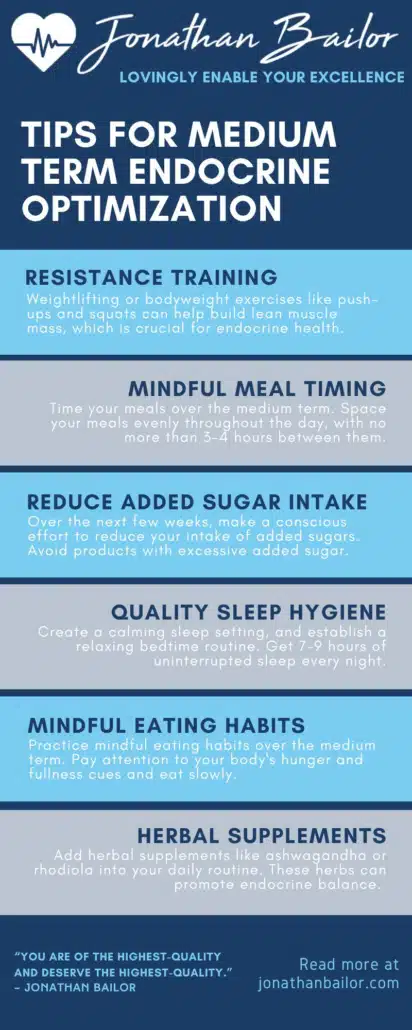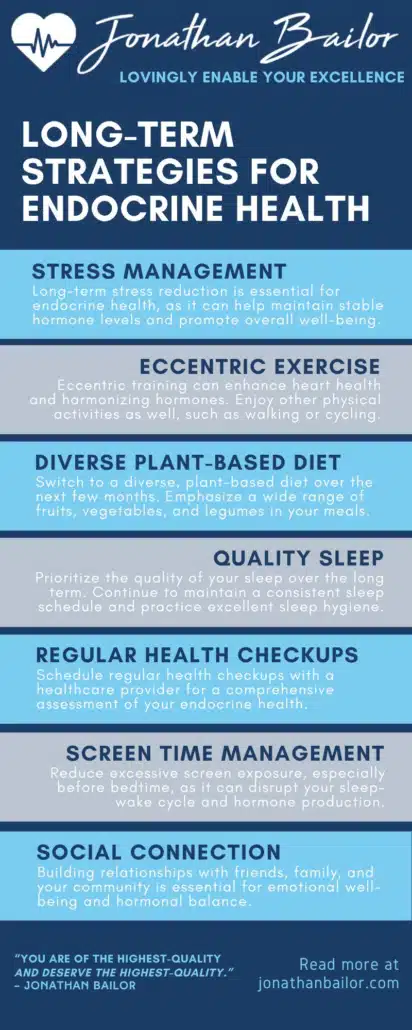26 Lifestyle Tweaks for a Vibrant Endocrine System: Timetable for Change
Here are 26 amazing lifestyle tweaks for a vibrant endocrine system in every stage of your life in this hormone health article with Jonathan Bailor!
Imagine you’re sitting down with a trusted friend, a warm cup of tea in hand, ready to chat about something that really matters—your health and well-being. Lean in, for you’re about to embark on a journey that unveils 26 essential lifestyle changes to boost your endocrine system at every stage of life.
Life is a beautiful journey, and at each stage, our bodies undergo unique transformations. Whether you’re in your 30s, 40s, 50s, or beyond, this guide has been tailored with you in mind. It understands that life’s demands can be challenging. But here’s the thing: improving your endocrine health doesn’t require a medical degree or hours of research. It’s about making simple, effective changes that can profoundly impact your quality of life.
Approach this journey with the empathy of someone who deeply cares about your health and well-being. Know that you, like many others, are searching for practical, actionable advice that can be easily integrated into your daily routine.
As you read on, you’ll discover how to nurture your endocrine system, that intricate network of glands and hormones that plays a pivotal role in your overall health. These 26 lifestyle tweaks are not just about longevity; they’re about living vibrantly and experiencing each day to its fullest.
It’s more than just words on a screen; it’s an opportunity to take control of your health, embrace your vitality, and share this empowering knowledge with your loved ones. Together, let’s unlock the secrets to a healthier, happier you, one lifestyle change at a time.
If you love this content then make sure to check out our 26 Lifestyle Changes for a Thriving Endocrine System and New Year, New You: 12 Revolutionary Weight Loss Strategies for 2024 guides!
Immediate Shifts for Enhanced Endocrine Health
1. Hydration for Hormonal Harmony
In the quest to boost your endocrine system right now, let’s begin with a simple yet transformative change – drink more water. Proper hydration is the cornerstone of hormonal balance. When adequately hydrated, your glands can function optimally, and your hormones can travel freely throughout your body. Aim for at least eight glasses of water daily. To make it more enjoyable, add a splash of lemon or a few cucumber slices for a refreshing twist. Small sips throughout the day will keep you feeling energized and support your endocrine health immediately.
2. Sleep Like Your Hormones Depend on It
Your endocrine system loves a good night’s sleep. In the short term, prioritize your slumber. Ensure you’re getting 7-9 hours of quality sleep each night. When you sleep, your body regenerates and balances hormone levels. Create a soothing bedtime routine—dim the lights, disconnect from screens, and maybe even indulge in a calming cup of herbal tea. Quality rest tonight can lead to immediate improvements in how you feel tomorrow.
3. Balanced, Nutrient-Rich Meals
The food you put into your body immediately impacts your hormones. Opt for balanced, nutrient-rich meals rich in colorful vegetables, lean proteins, and healthy fats. Cut back on processed foods, sugary snacks, and excessive caffeine. These dietary tweaks can provide quick benefits like improved mood, energy, and concentration.
4. Stress-Busting Breathing Exercises
Stress can severely impair your endocrine system in the short term. Combat it with a few minutes of deep breathing exercises. Find a quiet spot, close your eyes, and inhale deeply through your nose for a count of four. Hold for four seconds, then exhale slowly through your mouth for another count of four. Repeat this for a few cycles. Deep breathing can immediately reduce stress hormones and bring a sense of calm to your day.
5. Limit Artificial Hormone Disruptors
Look around your immediate environment and identify sources of hormone disruptors. Replace plastic containers with glass or steel and avoid microwaving in plastic. Check your personal care products for harmful chemicals and opt for natural alternatives. By minimizing your exposure to artificial hormone disruptors right now, you’re taking an instant step towards a healthier endocrine system.
6. Move Your Body Gently
Short-term movement is essential for endocrine health. Engage in gentle activities like walking, stretching, or yoga. These low-impact exercises can immediately help your body regulate hormones and reduce stress. Take a short stroll after meals to aid digestion and stabilize blood sugar levels. In just a few minutes, you can experience the benefits of physical activity on your hormones.
Remember, the journey to improved endocrine health starts with small, immediate changes that add up over time. By incorporating these adjustments into your daily routine, you’ll be well on your way to a more vibrant, balanced life.

Feeling Better Is Priceless, That's Why We Don't Put A Price On It!
“It’s Like A Free and Medically Valid Version of Noom and Weight Watchers Online”
~ Dr. Doctor Matthew Oleshiak, MD
Click the 'LEARN MORE' button below for free lifetime access to the fast fix program developed by Jonathan and top Ivy League Medical Doctors
LEARN MOREP.S. It's not a free trial. It's not part of the program for free. The entire program is free, forever, for real! No credit card needed.
Quick Fixes for Short-Term Endocrine Harmony
1. Sleep Schedule Reset
Resetting your sleep schedule can quickly work wonders for your endocrine system. Try going to bed and waking up at the same time every day, even on weekends. This consistency helps regulate your body’s internal clock and can improve the quality of your sleep. In a few days, you’ll likely notice increased alertness and a better mood during your waking hours.
2. Whole Foods, Real Gains
Switching to a whole-food diet can noticeably impact your endocrine health in the short term. For the next few days, focus on incorporating fresh, low-sugar fruits, nonstarchy vegetables, nutrient-dense lean proteins, and whole-food fats into your meals. Ditch processed foods and sugary snacks. This shift can quickly stabilize blood sugar levels, boost energy, and promote hormonal balance.
3. Mindful Stress Reduction
In the short term, take a few days to practice mindfulness and stress-reduction techniques. Set aside a few minutes each day for meditation or deep breathing exercises. These practices can help lower stress hormone levels and promote an immediate sense of calm and well-being.
4. Herbal Allies for Hormonal Harmony
Explore the world of herbal teas known for their positive effects on endocrine health. For the next few days, sip on teas like chamomile, peppermint, or licorice root. These herbal allies can support hormonal balance and soothe your digestive system. Enjoying a warm cup of these teas daily can offer quick relief and harmony.
5. Spice Up Your Meals
Add a dash of spice to your meals for short-term endocrine benefits. Incorporate spices like cinnamon, turmeric, and ginger into your dishes. These spices contain compounds that help regulate blood sugar levels and reduce inflammation. You might notice improved digestion and a more stable mood in just a few days.
6. Stay Hydrated with Herbal Infusions
Replace your usual beverages with herbal infusions for a few days. Try options like hibiscus, dandelion, or nettle tea. These herbal infusions can provide hydration while also supporting your endocrine system. Their natural compounds can help cleanse your body and boost vitality quickly.
7. Light Evening Movement
Engage in light evening movement for a few days to support your endocrine health. After dinner, take a leisurely walk around your neighborhood or do some gentle stretching exercises. These activities can aid digestion, regulate blood sugar, and promote better sleep, all of which can be felt in just a few days.
By making these short-term changes, you can experience immediate improvements in your endocrine health. These simple adjustments are like a quick boost for your overall well-being, setting the stage for long-term vitality and balance.

Strategies for Medium-Term Endocrine Optimization
1. Integrate Resistance Training
Over the next few weeks, consider incorporating resistance training into your fitness routine. Weightlifting or bodyweight exercises like push-ups and squats can help build lean muscle mass, which is crucial for endocrine health. To optimize the beneficial effects of resistance training, focus on the downward or eccentric portion of the movement. As you gradually increase your strength, you’ll experience improved insulin sensitivity and hormone regulation. This medium-term commitment to resistance training can yield noticeable results in your energy levels and overall well-being.
2. Mindful Meal Timing
Pay attention to meal timing over the medium term. Space your meals evenly throughout the day, with no more than 3-4 hours between them. This approach can help regulate hunger hormones and stabilize your metabolism. In a matter of weeks, you’ll notice improved digestion, reduced cravings, and better overall appetite control.
3. Reduce Added Sugar Intake
Over the next few weeks, make a conscious effort to reduce your intake of added sugars. Read food labels and avoid products with excessive added sugar. Cutting back on sugary treats and drinks can lead to better blood sugar control and a more balanced endocrine system. As you gradually reduce your sugar consumption, you’ll experience increased energy levels and an improved mood.
4. Quality Sleep Hygiene
Invest in quality sleep hygiene practices for the medium term. Create a comfortable and calming sleep environment, and establish a relaxing bedtime routine. It is recommended that you get 7-9 hours of uninterrupted sleep every night. Over the next few weeks, these changes will lead to deeper, more restorative sleep, resulting in improved hormonal balance, heightened alertness, and a brighter mood during the day.
5. Mindful Eating Habits
Cultivate mindful eating habits over the medium term. Pay attention to your body’s hunger and fullness cues, and eat slowly and without distractions. This practice can promote balanced hormones and a healthier relationship with food. In a matter of weeks, you’ll find yourself making better food choices and experiencing improved digestion.
6. Explore Herbal Supplements
Over the next few weeks, consider incorporating herbal supplements like ashwagandha or rhodiola into your daily routine. These herbs are known for their adaptogenic properties, which can help your body adapt to stress and promote endocrine balance. As you consistently take these supplements, you may notice increased resilience to stress and enhanced overall well-being.
These medium-term strategies offer a path to lasting improvements in your endocrine health. Commit to these changes over the coming weeks, and you’ll be well on your way to a more balanced and vibrant life.

Long-Term Commitments for Endocrine Vitality
1. Regular Stress Management Practice
Over the coming months, establish a regular stress management practice in your life. This might include daily meditation, mindfulness exercises, or yoga sessions. Long-term stress reduction is essential for endocrine health, as it can help maintain stable hormone levels and promote overall well-being. As you make this a part of your routine, you’ll notice a gradual reduction in stress-related symptoms and a more balanced emotional state.
2. Consistent Eccentric Exercise
Embrace the journey of consistent eccentric exercise as your strategic ally for endocrine health. This approach, focusing on the muscle-extending phases of movement, transcends traditional aerobic activities like jogging, swimming, or cycling. It’s about enhancing cardiovascular health and harmonizing hormones, but with the added depth of eccentric training. Enjoy other physical activities as well, such as walking, dancing, and cycling.
3. Diverse Plant-Based Diet
Transition to a diverse, plant-based diet over the next few months. Emphasize a wide range of fruits, vegetables, and legumes in your meals. This dietary shift provides essential nutrients and fiber that support your endocrine system and overall health. Over time, you’ll notice improved digestion, increased energy levels, and a more vibrant complexion.
4. Quality Sleep Prioritization
Prioritize the quality of your sleep over the long term. Continue to maintain a consistent sleep schedule and practice excellent sleep hygiene. Investing in a comfortable mattress and creating a tranquil sleep environment will pay off in the months ahead. Over time, you’ll experience deep, restorative sleep, contributing to stable hormone levels, heightened cognitive function, and a positive outlook.
5. Regular Check-Ins with a Healthcare Provider
Schedule regular check-ins with a healthcare provider for a comprehensive assessment of your endocrine health. These visits will allow for early detection of any potential issues and provide guidance on maintaining hormonal balance. Over the long term, this proactive approach to healthcare can lead to a deeper understanding of your body’s needs and a more informed approach to your well-being.
6. Mindful Screen Time Management
Implement mindful screen time management as a long-term commitment. Reduce excessive screen exposure, especially before bedtime, as it can disrupt your sleep-wake cycle and hormone production. Set boundaries on device use and create tech-free zones in your home. These changes will contribute to improved sleep quality, better focus, and enhanced overall health in the months ahead.
7. Engage in Social Connection
Prioritize social connection and engagement over the long term. Building and maintaining relationships with friends, family, and your community is essential for emotional well-being and hormonal balance. Invest time nurturing these connections through regular gatherings, phone calls, or shared activities. Over time, you’ll experience reduced stress, an improved mood, and a more robust support system.
These long-term commitments are investments in your endocrine health and overall quality of life. By embracing these changes, you’ll be on a path to lasting vitality and well-being that will benefit you for years to come.

Navigating Hormone Health: Your Questions Answered
Q1: What role do hormones play in our bodies, and why is hormonal balance important?
A1: Hormones are chemical messengers produced by various glands in the endocrine system. They regulate nearly every bodily function, from metabolism and growth to mood and reproduction. Maintaining hormonal balance is crucial because it ensures that these functions operate harmoniously. When hormones are out of balance, it can lead to a range of health issues, such as mood swings, weight gain, fatigue, and even more serious conditions like diabetes or thyroid disorders. Hormonal balance supports overall well-being and enables your body to function optimally.
Q2: How can I tell if my hormones are imbalanced, and what are the common signs to watch for?
A2: Recognizing hormonal imbalance can be challenging because it often manifests differently in individuals. However, some common signs include irregular menstrual cycles, mood swings, unexplained weight changes, skin problems, hair loss or growth, fatigue, and sleep disturbances. If you’re experiencing persistent or severe symptoms that disrupt your daily life, it’s essential to consult a healthcare provider. They can conduct tests to identify hormonal imbalances and work with you to develop a personalized treatment plan.
Q3: Can lifestyle changes really impact hormonal balance, and if so, what changes should I consider making?
A3: Absolutely, lifestyle changes can significantly influence hormonal balance. Factors like diet, exercise, stress management, and sleep all play a role. To support hormonal health, consider incorporating a balanced diet rich in whole foods, engaging in regular physical activity (both aerobic and eccentric resistance training), practicing stress-reduction techniques like meditation or deep breathing, and prioritizing quality sleep. Additionally, reducing exposure to environmental toxins and managing your weight can positively impact hormonal balance.
Q4: Are there specific dietary recommendations for hormonal health, and how can I incorporate them into my daily meals?
A4: Yes, there are dietary recommendations that can promote hormonal balance. Focus on consuming fiber-rich foods, healthy fats, and lean proteins. Incorporate plenty of colorful fruits, vegetables, legumes, and nuts into your meals. Avoid excessive sugar, processed foods, and trans fats, as they can disrupt hormonal function. Consider adding hormone-supportive foods like fatty fish (rich in omega-3 fatty acids), cruciferous vegetables (broccoli, cauliflower), and foods high in antioxidants (berries, spinach). Creating balanced and diverse meals with these elements can contribute to hormonal harmony.
Q5: Is hormonal therapy or medication necessary for managing hormone imbalances, and when should I consider it?
A5: Hormonal therapy or medication may sometimes be necessary, but it should be discussed with a healthcare provider. They will assess your specific hormonal imbalance, its underlying causes, and the severity of your symptoms. For certain conditions, like hypothyroidism, diabetes, or hormone-related disorders, medication may be prescribed to restore balance. However, lifestyle modifications are often a crucial component of hormone management. Your healthcare provider will work with you to determine the most appropriate treatment plan based on your needs and circumstances. Always consult a healthcare professional before starting any hormonal therapy or medication.
Q6: What are the glands of the endocrine system?
The endocrine glands that produce hormones include:
- Pituitary gland (produces growth hormone and thyroid stimulating hormone)
- Pineal gland (produces melatonin)
- Thyroid gland (produces thyroid hormones)
- Parathyroid glands
- Adrenal gland (produces steroid hormones like cortisol stress)
- Gonad glands (the gonads and adrenal glands produce sex hormones)
Empower Your Hormone Journey: Share the Wisdom
As you embark on your journey towards hormonal harmony, remember that knowledge is the key to empowerment. By making immediate, short-term, medium-term, and long-term changes in your life, you can cultivate a thriving endocrine system and a more vibrant you. Hormonal balance isn’t just a goal; it’s a lifelong commitment to your well-being.
Now, take a moment to share this valuable wisdom with your friends and family. Let them join you on this transformative path to better health. Please share this article via email or on your favorite social media platforms, and together, let’s empower more lives with the gift of hormonal vitality. Your journey can inspire others to embark on their own, creating a ripple effect of wellness and happiness. Thank you for being a part of this journey toward greater well-being.
Feeling Better Is Priceless, That's Why We Don't Put A Price On It!
“It’s Like A Free and Medically Valid Version of Noom and Weight Watchers Online”
~ Dr. Doctor Matthew Oleshiak, MD
Click the 'LEARN MORE' button below for free lifetime access to the fast fix program developed by Jonathan and top Ivy League Medical Doctors
LEARN MOREP.S. It's not a free trial. It's not part of the program for free. The entire program is free, forever, for real! No credit card needed.




